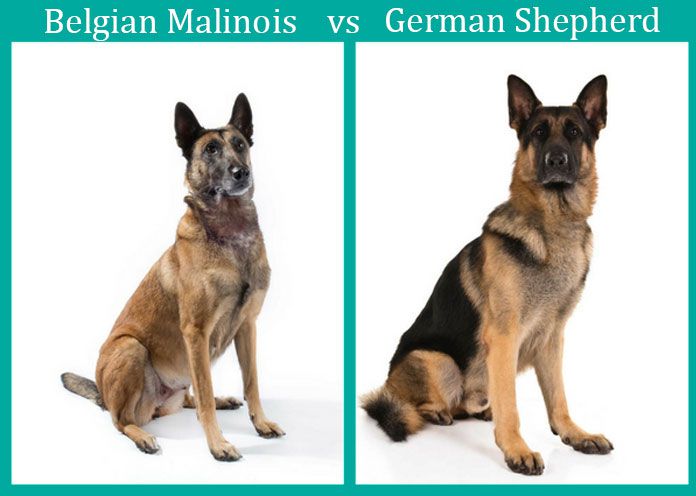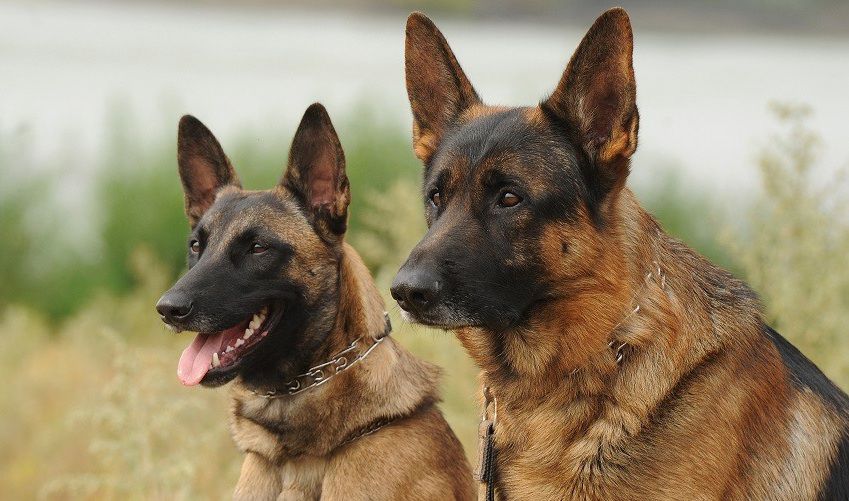For many decades, German Shepherds were the working dogs of choice for police forces, and those interested in training dogs as protectors of the home. But nowadays, Belgian Shepherds are gaining popularity, and in many instances, people don’t even know the differences. We take a look at German Shepherds versus Belgian Shepherds and the reasons why the Belgians are so popular these days.

Best Gifts for German Shepherd Lovers
[ux_products products=”24″ tags=”german-shepherd-products” orderby=”rand”]Belgian Shepherds Generally Have Fewer Health Issues
German shepherds are beautiful dogs, but the breed standard requires them to have sloping hindquarters. As a result, although Belgian Shepherds, including the Malinois which is very similar in appearance to the GSD, are inclined to be less likely to suffer from hip dysplasia. This is one of the primary reasons why they are replacing German Shepherds as police dogs.
Regardless of which breed you choose, be sure to consult a veterinary clinic which offers a suite of diagnostic services such as those available at Paoli Vetcare, for example to ensure that your puppy is in good health.
Although Belgian Shepherds are believed to be more prone to aggression, a well-trained dog will be manageable, and is less likely to have its lifespan curtailed owing to weak hips.
Both Breeds are Highly Trainable But The Belgians are Less Stubborn
Both German shepherds and Belgian Shepherds are highly trainable breeds, but once again, the Belgian Shepherd has the edge. This breed is rather more sociable than it’s German cousins, and enjoys physical activity. So, at times when a German Shepherd may simply refuse to cooperate, it’s Belgian counterpart will be more willing to investigate activities – and the rewards that follow.
Size, Speed and Aggression
Although a large Belgian Shepherd can easily outstrip a small German Shepherd in terms of size, German Shepherds are generally larger dogs. However, the smaller Belgian Shepherd is a more active dog and is capable of greater speed.
At the same time, Belgian Shepherds are more likely to be aggressive, so using their trainability to counterbalance their potential for aggressive behaviour will be a priority. Socialization will be key since they are particularly prone towards aggression towards other dogs.

Grooming Needs
Both German Shepherds and Belgian Shepherds have a soft, fluffy undercoat that makes for plenty of shedding when the season changes. However, German Shepherds take the prize for messy shedding and will have a greater need for grooming than their Belgian relatives. For those with pet hair allergies, a breed with shorter hair and no undercoat could be a better choice.
Separation Anxiety
Highly intelligent, active dog breeds are often prone to separation anxiety which leads to bad behavior while pet owners are out. Here, German Shepherds are once again higher maintenance than Belgians, who will nonetheless miss you when you aren’t at home. While German shepherds are more prone to take this out on the garbage bin, a bored Belgian may resort to obsessive licking and biting of his own paws. In either case, you’re looking at a dog with a strong need for companionship. Which is hardier? Most experts will say that the Belgian is a little less needy.
Which Should You Choose?
Choice is a very personal thing, and it would be difficult to make individual recommendations without knowing the individuals in question. However, it is certain that German Shepherds will require more attention from their owners, and there is a strong likelihood of a greater need for veterinary help.
If you already are in love with German Shepherds, choose a good breeder and ensure that your puppy has been screened for hip dysplasia. If you are hoping for a longer lifespan, the smaller, tougher Belgian Shepherd is more likely to deliver it. Either way, these delightful working dog breeds require active, thoughtful owners who are able to give them the attention they deserve.
